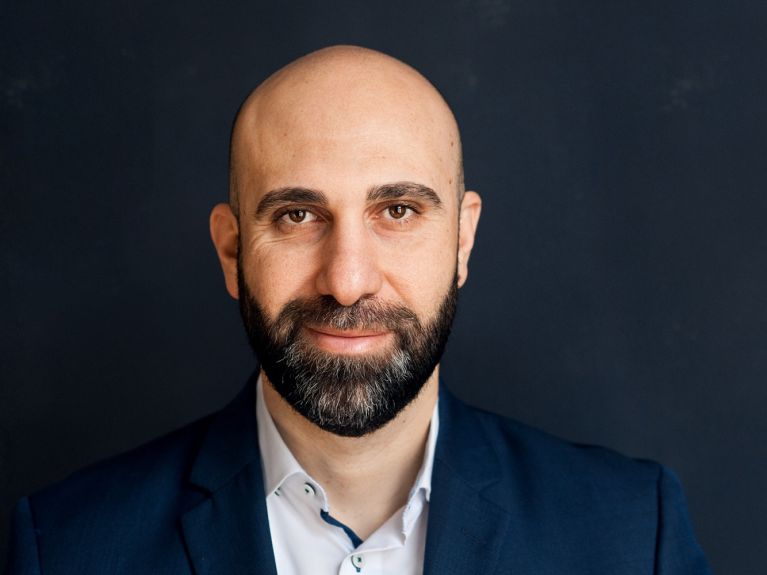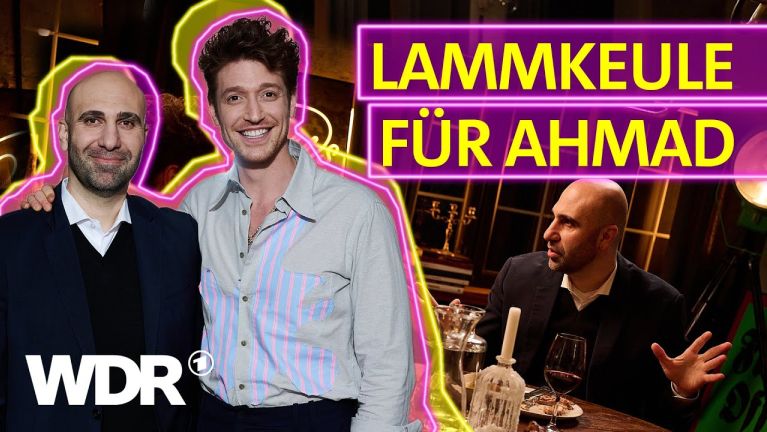“It all began with an e-mail sent one night”
He knows all about hate – but has moved on. These days, Ahmad Mansour fights extremism in Germany. Read about what motivates him.

Ahmad Mansour moved from Tel Aviv to Berlin 18 years ago and has been fighting racism, extremism and anti-Semitism in Germany ever since. Through his work, the psychologist has already helped thousands of young people and adults – nonetheless, he by no means feels that he has reached his ultimate goal.
Mr Mansour, you are an Arab Israeli who was born in Tira and emigrated to Germany as a young man in 2004. This year you were awarded the Federal Cross of Merit, Germany’s highest state award honouring social achievements. What does this mean to you?
A huge amount! It is good to feel part of this country and to know that one’s work is acknowledged. After all, at times I have also attracted harsh criticism in the German public sphere for some of my attitudes towards religious extremism, so it was a great pleasure for me to receive this award. It gives an incredible boost to my own sense of integration and encourages me in what I am doing here in Germany.
You originally studied clinical psychology but then moved into the area of youth work, awareness training and prevention. Where and how did you discover your true vocation – fighting against Islamism, racism and anti-Semitism?
This was something that already mattered a lot to me early on in my life, in my relationships not only with my parents but also with my Jewish friends in Israel. I was very interested in politics as a young adult and in 1995 also took part in the big peace demonstrations shortly before Yitzhak Rabin was murdered. It was actually more by chance that I ended up, after graduating in psychology, doing youth work in Berlin in 2007: one night I saw a TV report about honour killings in Germany. This came as a total surprise to me, as I thought things like that only happened in the Middle East. That same night I wrote an e-mail to the commissioner for integration in Berlin’s Neukölln district, where many families of Turkish and Arab descent live. I offered my help and the commissioner pointed me in the direction of an awareness project at schools that was urgently seeking staff. That’s how it all started.
As a young adult, you yourself almost drifted into Islamic fundamentalism despite having grown up in a non-religious family. Your degree course helped you gain some distance from this life and critically question ideologies. Is education an important part of prevention work?
That is too much of a generalisation. Academic qualifications may help, but they do not have to. Many people think that extremists are always poorly educated losers – that is by no means the case, and some are even highly educated. However, what I experienced at the university in Tel Aviv was amazing: we students were encouraged to think critically, and we learnt to debate and argue objectively. And for the first time I read books that made me begin to have doubts about the way I viewed the world at that time. This kind of education is definitely an effective way of countering radicalisation.
These days, one of your jobs is to teach intercultural skills to budding police officers in Berlin. What is the key message you convey to them?
I see my work as part of numerous efforts to make the police force more modern, enabling it to respond better to social developments. Police officers in the capital Berlin need intercultural skills every day in their work. They encounter dozens of different nationalities on the city’s streets and come into contact with many different cultures. It is therefore important to understand on the one hand that anyone can be affected by racism – but also that anyone can reproduce racism, regardless of their education, culture, religion or skin colour. Incidentally, I find the police to be extremely openminded and willing to discuss this issue.
I want to see a broad-based societal offensive.
In “Solidarisch sein!” (i.e. Show Solidarity!), the book you published in 2020, you write about the “nightmare of anti-Semitism“, explaining that this phenomenon is becoming louder and more aggressive in Germany and occurs in “virtually all milieus” – this is an extremely shameful conclusion some 80 years after the Holocaust. Do educational institutions in Germany need to try even harder to reach young people?
Actually, I do believe that a lot needs to be done in that respect. We need a modern culture of memory that also includes people of non-German origin. My team and I try to put this into practice in the “ReMember” project. We bring young people with and without migrant backgrounds together so that they can jointly explore German history and the subject of anti-Semitism. Another major challenge that I see is in the area of digital media. How can we make social media networks more democracy-ready? How should we react to propaganda, fake news or anti-Semitic conspiracy theories? Schools also need to be involved a great deal more in this area. What I really want to see is a broad-based societal offensive.
You have meanwhile set up your own institute that offers numerous prevention workshops to combat Islamic extremism and anti-Semitism. Is your focus limited solely to Germany?
The institute works Europe-wide and is involved among other things in projects in Austria and collaborations in Switzerland. In Germany we work together with many state-level governments, federal ministries and public institutions. Politically, we are completely independent. What is important to us is that the training programmes should prove helpful for educators and young people at the local level – i.e. that some of what they have learnt sticks in their minds and actually results in them changing their behaviour.
Dieses YouTube-Video kann in einem neuen Tab abgespielt werden
YouTube öffnenThird party content
We use YouTube to embed content that may collect data about your activity. Please review the details and accept the service to see this content.
Open consent formYou are now 46 years old, and a successful author, expert and founder – not to mention the winner of multiple awards. What goals do you still have for the future?
I still have so many goals and feel I’ve only just got started! My German dream, if I may call it that, is to actively help shape society. I want to be a voice that is heard, I want to make a difference, and I want to change society for the better. However, I admit that – like many migrants – I also experience moments of crisis. Sooner or later one starts romanticising one’s old home country and having doubts about the new one. For example, I am often not satisfied with the culture of debate in Germany and want to see more commitment on the part of politicians and society to fight extremism and anti-Semitism. But that does nothing to change my basic sense that Germany is now my home and I am very happy to be able to live here.
About Ahmad Mansour
Ahmad Mansour (*1976) is an Arab Israeli who has been living in Berlin since 2004. A psychology graduate, he has been working for many years in numerous educational projects and initiatives to combat extremism and promote democracy. Furthermore, he is one of Germany’s most important experts on Islamism, writing books, publishing articles and giving lectures. In 2018 he founded Mind Prevention (the Mansour initiative to promote democracy and prevent extremism); in the autumn of 2022 his latest book will be published: Operation Allah – Wie der Politische Islam unsere Demokratie unterwandern will (i.e. Operation Allah – How political Islam wants to infiltrate our democracy). He has won numerous prizes for his work, most recently the Federal Cross of Merit in July 2022.


